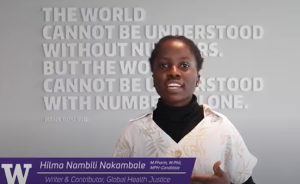We are 16 months into the COVID-19 pandemic and about a year into the discussion to waiver the intellectual property rights for manufacturing the COVID-19 vaccine. In May 2020, the World Health Organization launched the COVID-19 Technology Access Pool (C-TAP) after a request from the president of Costa Rica for voluntary arrangement by the owners of intellectual property and other forms of knowledge, clinical data and know-how relevant to the development and manufacture of diagnostic tests, devices, medicines, or vaccines to contribute their knowledge to a pool.
A year after establishing the C-TAP, we are sitting with new COVID-19 variants, millions of unvaccinated people in developing countries and little to no commitment to waiver the intellectual property rights particularly for manufacturing the COVID-19 vaccine. We continue to witness the COVID-19 virus paralyzing the global economy and ravaging millions of lives in Africa and India. Yet the World Trade Organization, big pharma and critical stakeholders in COVID-19 vaccine production and distribution have not shown an urgent priority to waiver the intellectual property rights. Most countries in the global north, including the United States, are slowly returning to normal after vaccinating a significant proportion of their populations. Yet Africa has thus far vaccinated less than 5% of its population.
The COVAX program, which was established by the World Health Organization in April 2020, has so far not produced promising deliverables through its commitment to provide an adequate amount of COVID-19 vaccine to low- and middle-income countries in a reasonable time. Canada, for example, has secured five times more COVID-19 vaccine doses than its population needs, yet Haiti has practically no vaccine availability. There has been no call for moral accountability to ensure equitable distribution of the COVID-19 vaccine, particularly in consideration of time.
The constraints of the COVAX are evident and should be promptly highlighted to accelerate a more sustainable solution – to waiver the intellectual property rights for the COVID-19 vaccine manufacturing. The reluctance in wavering the intellectual property rights for manufacturing the COVID-19 vaccine appears to be intentional; with its proponents justifying false myth that Africa lacks the capacity to produce the vaccine as there are many challenges beyond the use of the mRNA technology.
African has asserted its commitment to acquire the COVID-19 vaccine through coalitions such as the African Vaccine Acquisition Trust Team (AVATT), created by President Cyril Ramaphosa, Chairperson of the African Union in November 2020. The AVATT functions in collaboration with the African Export-Import Bank to secure the necessary vaccines and blended financing resources for achieving Africa’s COVID-19 vaccination strategy which targets vaccinating a minimum of 60% of Africa’s population. A collaboration like the AVATT could simply work on vaccine production in Africa by sharing resources to enable vaccine production at an affordable price had the intellectual property rights been waivered.
Over and over, we hear arguments citing lack of production capacity in Africa. THis is simply not credible. When rich countries were trying to protect patent rights for antiretroviral drugs for AIDS treatment, – and repeating the same ‘lack of capacity’ argument, these drugs began to be produced in low-to-middle income countries like India, Brazil and South Africa. Companies like Cipla and Ranbaxy Pharmaceuticals (India) are some of the largest producers and distributors of generic antiretrovirals to many African countries. They also use pooled procurement, which reduces the costs even more.
The lethargic response in challenging big pharma to waiver intellectual property rights has shown that capitalism thrives even in times of rampant death as profits and business interests are put above saving lives in times of desperate need. The Global North has a moral duty to interrogate its refusal to waiver vaccine intellectual property rights and the World Trade Organization as a catalyst in this decision needs to be resolute in addressing this problem.
By: Hilma Nambili Nakambale
